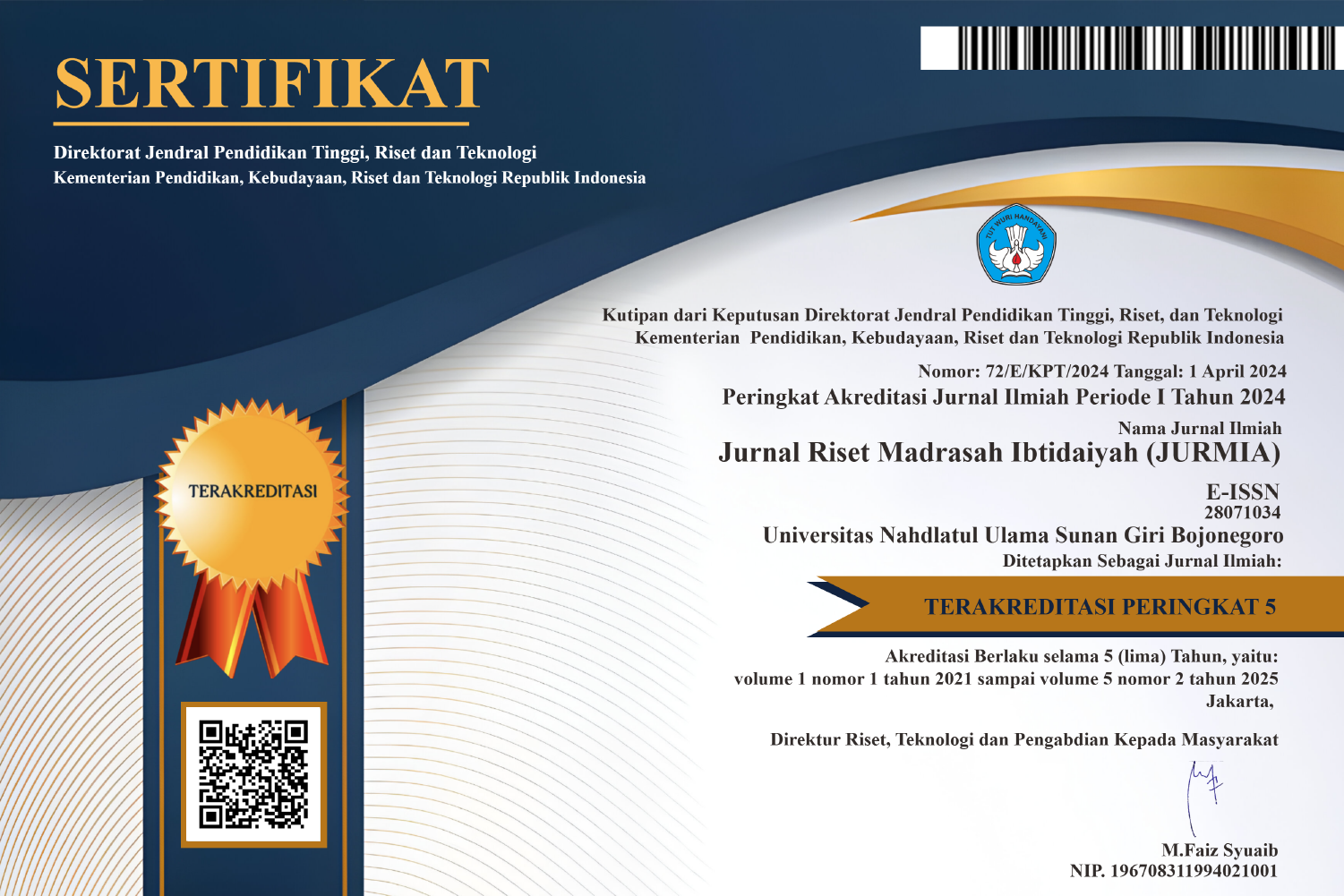Kemampuan Adaptasi Psikososial dengan Kemunculan Perilaku bermasalah pada Siswa Sekolah Dasar

DOI:
https://doi.org/10.32665/jurmia.v2i2.510Keywords:
Ability, Adaptation, Psychosocial, MisbehaviorAbstract
Students’ misbehavior that occurs in the school environment is a refraction of social cognition processes that can interfere with psychosocial development which can have a negative impact on adulthood. Poor psychosocial adaptation is suspected to be one of the causes of problematic behavior emergence, so preventive measures are needed. This study aimed to reveal the correlation between psychosocial adaptability and the emergence of misbehavior. The research subjects were 108 students in the first and second grades at three elementary schools in Singojuruh District, Banyuwangi. The sampling technique used purposive sampling. The research instrument used the SSRT (Social Skill Rating Scale) and SDQ (Strength and Difficulties Questionnaire). Data analysis used simple regression analysis. The results showed that there was a significant negative correlation (r = -0,271, p = 0.012). It means that the higher the psychosocial adaptability, the smaller the emergence of misbehavior and vice versa. Based on the analysis result, it can be concluded that developing students' psychosocial adaptability can be used as a method to prevent the emergence of misbehavior.
References
Aji, R. H. S. (2020). Dampak Covid 19 pada Pendidikn di Indonesia: Sekolah, Keterampilan, dan Proses Pembelajaran. SALAM: Jurnal Sosial & Budaya Syar’I, 7(5), 395-402.
Aliakbari, M., Mirzaee, A., & Aliabadi, T. H. (2013). On the secondary school teachers’ perceptions of students’ misbehavior: The case of Iranian male and female teachers. International Journal of Psychology and Behavioral Research, 2 (5), 240-249.
Aroma, I. S., & Sumara, D. R. (2012). Hubungan antara tingkat kontrol diri dengan kecenderungan perilaku kenakalan remaja. Jurnal Psikologi Pendidikan Dan Perkembangan, 01(02), 19-24.
Bureau of justice, national center for education statistics. (2020). Indicators of School Crime and Safety:2020. https://nces.ed.gov/pubs2021/2021092.pdf
Bryant, A. L., Schulenberg, J., Bachman, J. G., O’Malley, P. M., & Johnston, L. D. (2010). Understanding the links among school misbehavior, academic achievement, and cigarette use: a national panel study of adolescents. Prevention Science : The Official Journal of the Society for Prevention Research, 1(2). https://doi.org/10.1023/A:1010038130788
Dewi Niswatul Fithriyah, Suttrisno, Nurul Mahruzah Yulia, & Fiki Dzakiyyatul Aula. (2022). Dampak Pembelajaran Daring Selama Pandemic Terhadap Kemampuan Kognitif Peserta Didik. Jurnal Riset Madrasah Ibtidaiyah (JURMIA), 2(1). https://doi.org/10.32665/jurmia.v2i1.275
Finn, J. D., Fish, R. M., & Scott, L. A. (2008). Educational sequelae of high school misbehavior. Journal of Educational Research, 101(5). https://doi.org/10.3200/JOER.101.5.259-274
Fitria, Y. (2021). Deteksi Kesiapan Sekolah : Upaya Menakar Kemampuan Adaptasi Psikososial dengan Kemunculan Stres Akademik Pada Anak di Era Kenormalan Baru. Prosiding, Ikatan Psikologis Indonesia, 1(Temilnas Xii). https://ojs.unm.ac.id/Temilnas/article/view/20013
Istiqomah, I. (2017). Parameter Psikometri Alat Ukur Strengths and Difficulties Questionnaire (SDQ). Psympathic : Jurnal Ilmiah Psikologi, 4(2). https://doi.org/10.15575/psy.v4i2.1756
Karatas, Z., Sag, R., & Arslan, D. (2015). Development of Social Skill Rating Scale for Primary School Students-Teacher Form (SSRS-T) and Analysis of its Psychometric Properties. Procedia - Social and Behavioral Sciences, 197. https://doi.org/10.1016/j.sbspro.2015.07.093
Kartono, K. (2014). Patologi Sosial 2: Kenakalan anak &remaja. Jakarta: Rajawali Pers.
Kekerasan terhadap anak: Permasalahan dan pemecahanya. http://www.kpai.go.id
Kirmizi, O. (2015). The influence of laerner readiness on student statisfaction and academic achievement an online program at higher education. The Turkish Online Journal of Educational Technology, 14 (1), 133-142.
Mareta, P. R., Arif M, A., & Susanto, S. (2021). The Social Skills of Students in the Pandemic Period (The Case Study in SMAN 1 Kedunggalar, Ngawi District, East Java, Indonesia). Budapest International Research and Critics in Linguistics and Education (BirLE) Journal, 4(1). https://doi.org/10.33258/birle.v4i1.1618
Rehman, M., & Sadruddin, M. M. (2012). Study on the Causes of Misbehavior among South-East Asian Children. International Journal of Humanities and Social Science, 2(4), 162-175.
Romadhan, S. (2021). Pengembangan Bahan Ajar Budaya Literasi Melalui Cerita Rakyat dalam Membentuk Sikap Nasionalisme Siswa Sekolah Dasar. Jurnal Riset Madrasah Ibtidaiyah (JURMIA), 1(1), 81-88.
Sun, Rachel, C. F. (2014). Is school misbehavior a decision? implications for school guidance. International Journal of Social, Behavioral, Educational, Economic and Management Engineering, 8 (7), 2030-2034.
Suhada, Idad. (2016). Psikologi Perkembangan Anak Usia Dini. Jakarta. Rosdakarya.
Suttrisno, S. (2021). Analisis Dampak Pembelajaran Daring terhadap Motivasi Belajar Siswa Madrasah Ibtidaiyah. Jurnal Riset Madrasah Ibtidaiyah, 1(1), 348380.
Suttrisno, S., & Puspitasari, H. (2021). Pengembangan Buku Ajar Bahasa Indonesia Membaca dan Menulis Permulaan (MMP) Untuk Siswa Kelas Awal. Tarbiyah Wa Ta'lim: Jurnal Penelitian Pendidikan dan Pembelajaran, 83-91.
Velden, F., Brugman, D., Boom, J., & Koops, W. (2010). Moral cognitive processes explaining antisocial behavior in young adolescents. International Journal of Behavioral Development, 34(4). https://doi.org/10.1177/0165025409343705
Yoncalik, O. (2010). Student’s misbehaviuor in physical education lesson : A sample from turkey. Electronic Journal of Research in Educational Psychology, 8 (1), 59-86.
Yuan, X., & Che, L. (2012). How to Deal with Student Misbehaviour in the Classroom? Journal of Educational and Developmental Psychology, 2(1). https://doi.org/10.5539/jedp.v2n1p143
Downloads
Published
Issue
Section
License
Copyright (c) 2022 Yuli Fitria

This work is licensed under a Creative Commons Attribution 4.0 International License.
 PDF Download: 2649
PDF Download: 2649










